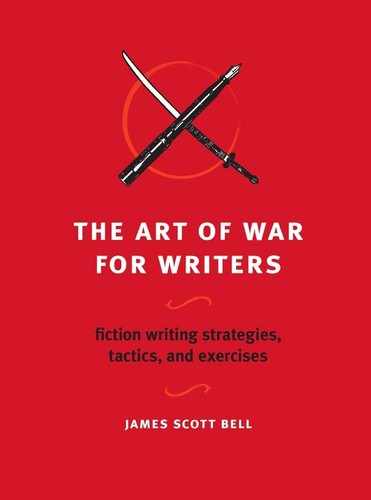
136
42
Utilize the Q Factor as a
strategic weapon for motivation
at just the right time.
When I teach fi ction writing at a conference, I usually
spend a few minutes talking about something I call the
Q Factor. It comes from the character in the James Bond
movies, the one who is always giving Bond his gadgets
and telling him not to play with them. There is a very
important reason this character exists.
Let’s cut ahead to the inevitable James Bond end-
ing. Bond has been hung by his ankles over a school of
piranha. The bad guy grins and says something like,
“Enjoy your swim, Mr. Bond.” Then he sets the timer to
lower James Bond into the pool of piranha and, of course,
leaves. (An interesting existential question is why villains
so often leave before their adversaries are dispatched.)
As Bond is lowered toward his doom, he manages
to get his thumb on one of his cuffl inks. The cuffl ink
turns into a small, rotating saw. He uses that saw to cut
through the restraints on his hands.
Now he is able to reach into his jacket pocket and
pull out a fountain pen. The fountain pen is, in reality,
a device that holds a compressed nitrogen charge and
Z4273i_127-159.indd 136Z4273i_127-159.indd 136 9/24/09 11:21:07 AM9/24/09 11:21:07 AM

137
shoots a small grappling hook and line across the pira-
nha pond, enabling Bond to cut his leg restraints and
swing to safety on the other side of the pool.
Now, if we had been reading along in the story and
gotten to this point, and Bond simply produced those
items for the fi rst time, we’d all be groaning. How con-
venient! What a cheat!
But of course, it was all set up by the Q scene. Be-
cause we saw these items before, we are perfectly accept-
ing of them when they come out at the right time.
In fi ction, the Lead character should reach a point
near the end when everything looks lost. This can be
something outside or inside the character, or both. But he
is, in fi gurative terms, dangling over a pool of piranha.
What he needs is courage for the fi nal battle, to face
the ultimate test. This is where the Q Factor can help.
It is something that is set up early in the story that will
provide the necessary inspiration or instruction for the
character when he needs it most.
Sometimes, the Q Factor is an icon of some sort, a
physical object. Sometimes, it is the memory of a beloved
mentor. It may simply be the character digging down
into his moral reservoir. Whatever it may be, it is the
storyteller’s job is to give it life on the page.
In the great Frank Capra fi lm Mr. Smith Goes to Wash-
ington, the naïve young senator played by James Stewart
arrives in Washington, D.C. for the fi rst time. He is mes-
merized by the city that represents everything he loves
Z4273i_127-159.indd 137Z4273i_127-159.indd 137 9/24/09 11:21:07 AM9/24/09 11:21:07 AM

138
about America. So he slips away from his handlers and
goes on a sightseeing tour, which is rendered in a won-
derful montage. The montage ends at the Lincoln Me-
morial. Here, young Jefferson Smith is deeply moved by
what he sees. He reads the words inscribed on the wall.
He sees a young boy holding his grandfather’s hand,
trying to say the words aloud. He observes an African-
American gentleman removing his hat. And then Smith
looks back up at the face of Lincoln.
We now have a very emotional object embedded in
our minds.
At the end of Act 2, Mr. Smith knows he is a political
puppet of a corrupt machine and has no way of fi ghting
back. He has even been betrayed by a senior senator who
had been a good friend of his father’s. Smith takes this as
the fi nal knife in his back and decides to leave town.
It’s nighttime, and he is passing the Lincoln Memo-
rial, but this time defeated and downcast. He sits heavily
on the steps.
Along comes the political operative played by Jean
Arthur. Originally, she thought of Smith as a dumb oaf,
too, but she has come to respect his integrity in this sea
of cynicism. She says, “I had a hunch I’d fi nd you here …”
And then she says, “Remember the fi rst day you got here?
Remember what you said about Mr. Lincoln? You said he
was sitting up there waiting for someone to come along.
You were right. He was waiting for a man who could see
his job and sail into it, that’s what he was waiting for. A
Z4273i_127-159.indd 138Z4273i_127-159.indd 138 9/24/09 11:21:07 AM9/24/09 11:21:07 AM

139
man who could tear into the Taylors and root ’em out
into the open. I think he was waiting for you, Jeff. He
knows you can do it. So do I.”
Smith gets inspired, and as they walk away, he pauses
to wave at Lincoln.
Now, when Mr. Smith undertakes the impossible
task of a single-man fi libuster, we understand and ac-
cept how he could do that. That’s the Q Factor.
Another example: When Luke Skywalker is engaged
in a fi nal battle in Star Wars, he hears the voice of Obi-Wan
telling him to remember to use the Force. Inspiration.
In a lot of old movies, you’ll have the Lead character
reaching the dark point, and hearing, in echoing tones,
the voice of something his father or mother told him a
long time ago. A moral sentiment that inspires the Lead
once more.
Sometimes, the Q Factor can be a negative emotion.
In High Noon, the classic Western starring Gary Cooper
as Will Kane, Kane fi nds himself as one man against four
killers. The townspeople have all come up with excuses
not to help him. He knows he will probably die. And the
real bummer is that he has just married Grace Kelly!
There comes a point just before the climax when
Kane is considering getting a horse and riding out of
town. He will get together with his wife again and go
somewhere and try to live without being found. He’s in
a livery stable, considering this.
Z4273i_127-159.indd 139Z4273i_127-159.indd 139 9/24/09 11:21:07 AM9/24/09 11:21:07 AM

140
Enter the character of Harvey, played by Lloyd Bridges.
Harvey is a coward and hates being in the shadow of the
great Will Kane. He sees Kane and knows that if he can
get him to ride out of town, in effect showing the town
that Kane is really a coward after all, then he, Harvey, will
look good in comparison.
As Harvey tries to get Kane to do this, Kane realizes
that if he does go, he will be no better than Harvey. And
that’s when he makes the decision to stay. Harvey, who
was introduced early in the fi lm, is the negative Q Factor
for Kane’s decision.
Think of it this way. So many stories are about over-
coming fear. The fear manifests itself most when all the
forces are marshaled against the Lead. Fear and common
sense tell her to give up, run away.
She knows she can’t. So give her a Q Factor, an emotional
element that comes in when she needs it. To do that:
1. Select what the element will be (item, mentor,
moral sentiment, negative character).
2. Write a scene early in the narrative that anchors
this element emotionally to the Lead.
3. Refer to the Q Factor once in the middle section,
as a reminder. You should do this subtly, almost
as a throwaway.
4. Find a trigger point in the Lead’s darkest hour
where the Q Factor can be reintroduced.
Z4273i_127-159.indd 140Z4273i_127-159.indd 140 9/24/09 11:21:07 AM9/24/09 11:21:07 AM
..................Content has been hidden....................
You can't read the all page of ebook, please click here login for view all page.
